
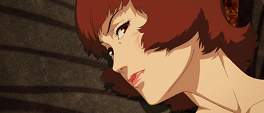

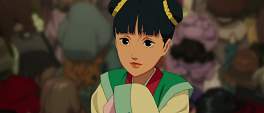
It's not a stretch to say that Paprika is the movie that Satoshi Kon has been building up to. Simply attaching his name to a film indicates its content: a trip into the human psyche where perspectives blend and questions about the nature of "self" are posed. This is no different and follows a similar formula to his other films where alternate realities begin to intrude on actual reality, eventually blurring the already indistinct line between the two. Intellectualism and introspection aside, while not a different blueprint to previous movies such as Perfect Blue or Millennium Actress, Paprika is far better paced and perhaps a lot more subtle than previous works, helped no doubt by the blindingly excellent animation from auteur favourite, Madhouse studios.
opening with a rampant and glittering circus performance, and ending with a chaotic and destructive parade
The questions Paprika asks are not new to anyone who has had a cursory glance at the philosophy and literature surrounding recent Hollywood fare, most notably The Matrix and Eternal Sunshine of a Spotless Mind among others; how it asks them is unique though. The film focuses on a device which allows a psychotherapy professional to both view and interact with a person's dreams, potentially identifying the root cause of their psychological problem and "fixing" it; this sets up a tight cast of characters ranging from an obese genius to a duplicitous therapist to a troubled police officer, all of whom take part in a technicolour journey that eventually culminates in a potentially world-altering event. The aforementioned therapist has the titular alter ego whose flippancy is only matched by her choice of attire and it is through her eyes and dives into dreamscapes that the story unfolds.
Read the rest of this entry
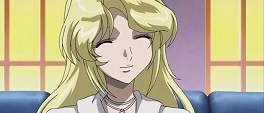
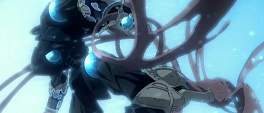
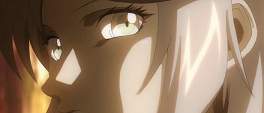
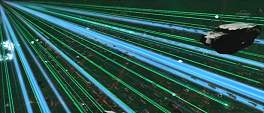
There is only one way to describe the scope and scale of Heroic Age: operatic. Far from the derogatory connotations of "Space Opera" championed by other anime such as Sekai no Senki (Banner of the Stars), it is a grand yet personal series which is ceaselessly ambitious, frequently breathtaking and always graceful and poised in its delivery. It is as diverged from the trappings of pulpy space opera as can be by excelling at both the intimate moments and the monumental battles.
favouring silence over exposition and meandering thoughts versus concrete conclusions
From Angela's typically vast opening through the orchestral stirrings comprising the bulk of the soundtrack to the tender melody of Ishikawa Yui's closing, even the audio of the series is grandiose, evocative and fitting as battles are fought, lives lost and emotions plucked. The most prominent part of Heroic Age is the epic battles fought across light-years and planets, yet even this is but a small part of the series as it never allows itself to be nailed down to one narrative device, switching seamlessly from a light hearted fish-out-of-water story to the machinations of the deity-like antagonists. The surprisingly large cast of characters are expertly fleshed out and range from fatally stupid to dashingly honourable; Deianeira, the protagonist and a royal princess, is pitched as the prototypical naive leader, however her astute decision making rightly inspires the most indomitable loyalty and by the climax her role as a strong, impassioned woman is unquestionable.
Read the rest of this entry
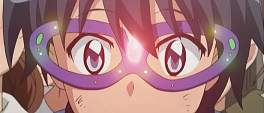
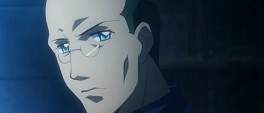
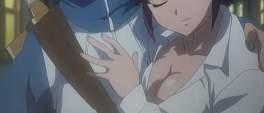
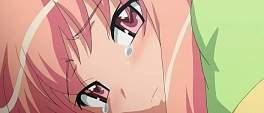
Why would one decide to watch Futatsuki no Kichi when the first season of Zero no Tsukaima is (to paraphrase Yahtzee) a cavalcade of mediocrity? Perhaps it's the simple reason that Futatsuki no Kichi (The Rider of the Twin Moons) improves upon its predecessor in all respects and manages to find its footing in both humour and characterisation.
Henrietta oscillates between caring monarch and sultry vixen
Gone are the staple characters of the first season, swiftly cast aside and replaced with fresh (female) faces; gone are the tepid attempts at humour now supplanted by copious amounts of fan-service, yuri and slapstick; and gone is the bloodless and pitifully shallow plot, storylines are now replete with pathos the first season couldn't hope to muster. This is not to say that the series is universally excellent, a satisfying conclusion is the most glaring omission, however its new-found confidence makes it far more entertaining and engaging to watch. The increased production values help this along, the animation is still by JC Staff but while characters and backgrounds feel similar, details and flourishes add to the overall feeling of assuredness.
Read the rest of this entry
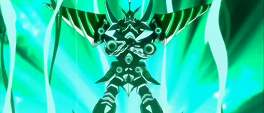
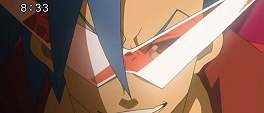
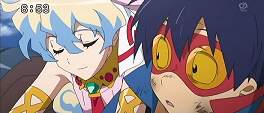
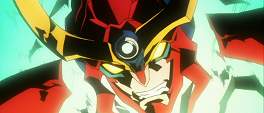
Pure boyish exuberance is the only way to describe Tengen Toppa Gurren Lagann; even given its parent company's predilection for unsatisfactory endings the series manages to be satisfying, smart and unique while paying homage to those that have tread similar ground before it. Gurren Lagann is without a doubt one of the most well-rounded pieces of anime to come out in what seems like a long time.
it's kinetic, brutal and divine
Ordinarily, shows which have such a large emphasis on growing stronger and are top-heavy with action set-pieces, there is a tendency to demean your audience with shallow characterisation or to bludgeon them with a lack of subtlety; this series does none of these things and manages to be viscerally appealing as well as emotionally layered. As with any good story, the core is simple: a coming-of-age for the protagonist Simon. Far from focusing on one aspect of this journey, Gurren Lagann charts Simon's meteoric rise from dirt-scratching child to heroic teenage leader to legendary saviour to wisened elder man; the sense of accomplishment and triumph at each stage is immense and, along with the cast of eclectic characters, tells the more immediate story of conquering insurmountable odds.
Read the rest of this entry
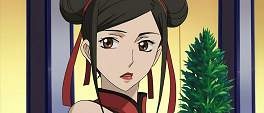
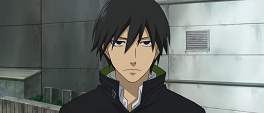
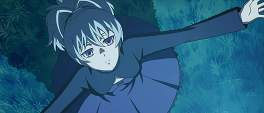
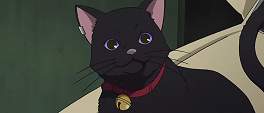
Darker than Black presents itself in shades of grey: muted morality and subtle story-telling; it built itself the enviable position of being as complex and involving as you allow it to be, peeling back layer upon layer if you care to look. Unfortunately the series falls short of perfection and in its quest to provide a softly-spoken and adult narrative, it omits to fill in some of the most glaring blanks and leaves some ideas stranded out at sea.
The hyperbole uttered in the first few minutes is easy to dismiss given the script's staunch refusal to repeat itself
Born from Tensai Okamura, animated by the creative powerhouse, BONES and scored by the seminal Yoko Kanno, Darker than Black was one of those projects gifted with immensely talented people and a head-start on becoming a classic. It arguable fails to achieve that illustrious title shared by so many other BONES productions but only through what it lacks rather than what it has in abundance.
Read the rest of this entry



















